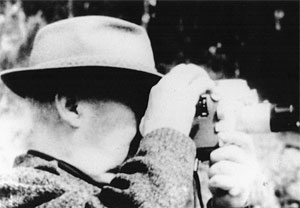 |
||||||
|
By Ronald Mangravite Five films by Jay Rosenblatt Get ready to sit. The busy summer film season in Miami continues with two remarkable events. The FIU-Miami International Film Festival will present the area premiere of Apocalypse Now Redux, the long-awaited director's cut of the acclaimed Vietnam War film by Francis Ford Coppola. The multi-award winner featured those performances now part of the American lexicon from the likes of Martin Sheen, Marlon Brando, Dennis Hopper, Robert Duvall, Laurence Fishburne, and Harrison Ford, among others. Coppola has said his longer version is the film that should have been released originally: "The themes emerge more clearly, and the film is funnier, sexier, more romantic, more political, and more bizarre, with more historical perspective." The one-time screening at the AMC Sunset is scheduled for Thursday, August 9, at 7:30 p.m. Tickets cost ten dollars. Call 305-348-5555. The second event is far less flashy but warrants giving your feet even more of a rest. The Louis Wolfson II Media History Center presents its first annual Rewind/Fast Forward Film and Video Festival, July 26 to 29, at the Colony Theater in Miami Beach. The fest, an eclectic mix of programming drawn from archival images, showcases the center's own mission as one of the largest film and video archives in the country. (For advance tickets and information, call the Wolfson Center at 305-375-1505.) The program includes the Florida premiere of Juan Carlos Zaldivar's 90 Miles, a personal chronicle of growing up in Castro's Cuba. Zaldivar will be on hand for a postscreening discussion. Other interesting selections include South of Brooklyn, about the Jewish experience in Miami Beach, and three documentaries that track veins in pop culture: Rock and Roll Revolution, Grass, and Twist. But the festival's highlight is an evening of Jay Rosenblatt's films, with the filmmaker in attendance. Rosenblatt is a critically acclaimed but virtually unknown filmmaker who has developed his own evocative, idiosyncratic style of filmmaking over the past two decades. The Brooklyn-born Rosenblatt, now a long-time San Franciscan, creates eerie, hypnotic films from "found footage," piecing together stories from bits of old films. His sources are eclectic -- educational films, silent biblical epics, science education shorts -- mostly from the Fifties and Sixties. The result is a highly original body of work, comprising shorts ranging from one to twenty minutes in length. The subject matter is always serious, but the style is often ironic with a deft comedic touch that crops up unexpectedly. The Rosenblatt program includes Restricted, a one-minute warm-up act that gives a taste of Rosenblatt's style. Using patches of old films and looped voice-over messages, Rosenblatt creates a crazy commercial for human anxiety. Short of Breath follows, a dreamlike exploration of depression and panic. The Smell of Burning Ants dissects what it means to grow up male in America, the cruelty and sadness of boyhood and the sense of grief and anger this can engender. Human Remains, a winner at the Sundance Film Festival (and of more than twenty other awards), looks at the banal private lives of twentieth-century dictators Hitler, Stalin, Mussolini, Franco, and Mao. The minutiae of these monsters tends to humanize them, rendering them all the more bewildering and horrific. The finale is King of the Jews, a remarkable film that grew out of Rosenblatt's own childhood fear of Jesus. Since he knew that Christians blamed Jews for the death of Jesus, he was afraid Jesus would come after him. The childhood meditation expands into an essay on anti-Semitism and persecution of Jews, a plight that Rosenblatt suggests resembles Jesus' own experience. The film uses stock footage from several Hollywood biblical epics, forestry films, and nature imagery to create a beautiful, moving finale of universal death and resurrection. In a recent telephone interview, Rosenblatt put words to his use of imagery. New Times: Your collage-essay form is quite striking and original. How did you end up in this style of filmmaking? Jay Rosenblatt: In a circuitous way. I had been making traditional narrative films using actors and found it stressful. Not just the pressures of creating the work but also economically. There seems to be a range of use of found footage in your films. You aren't trying to hide the disparities from shot to shot. Do you think up the text and find footage to match it? Or the other way around? Short of Breath seems the closest to linear narrative of the group you're screening here in Miami. How did you create that story? The film started as a mood. I wanted to make a film about suicide and depression. I was working as a counselor at a psychiatric hospital in the San Francisco Bay area, and these themes were on my mind. One day I happened to see some 16mm film cans that had been tossed in a dumpster in the hospital garage. I took them home and screened them; they were still in good shape. They turned out to be old training films for doctors. The subject was "bedside manner" techniques to handle patients in crisis. This was an incredible find. I began screening the films over and over and the project began to take [shape], using the doctor/patient interview as the throughline. Are you influenced by any particular filmmaker? In King of the Jews, you mix up fact and fiction, which seems to be the thesis of the film -- that history has been tinkered with. Is it using your own family's home-movie footage? Is this personal-essay format a trend? What are you working on now? I guess your style of filmmaking must make it tough to make a living at it. |
||
